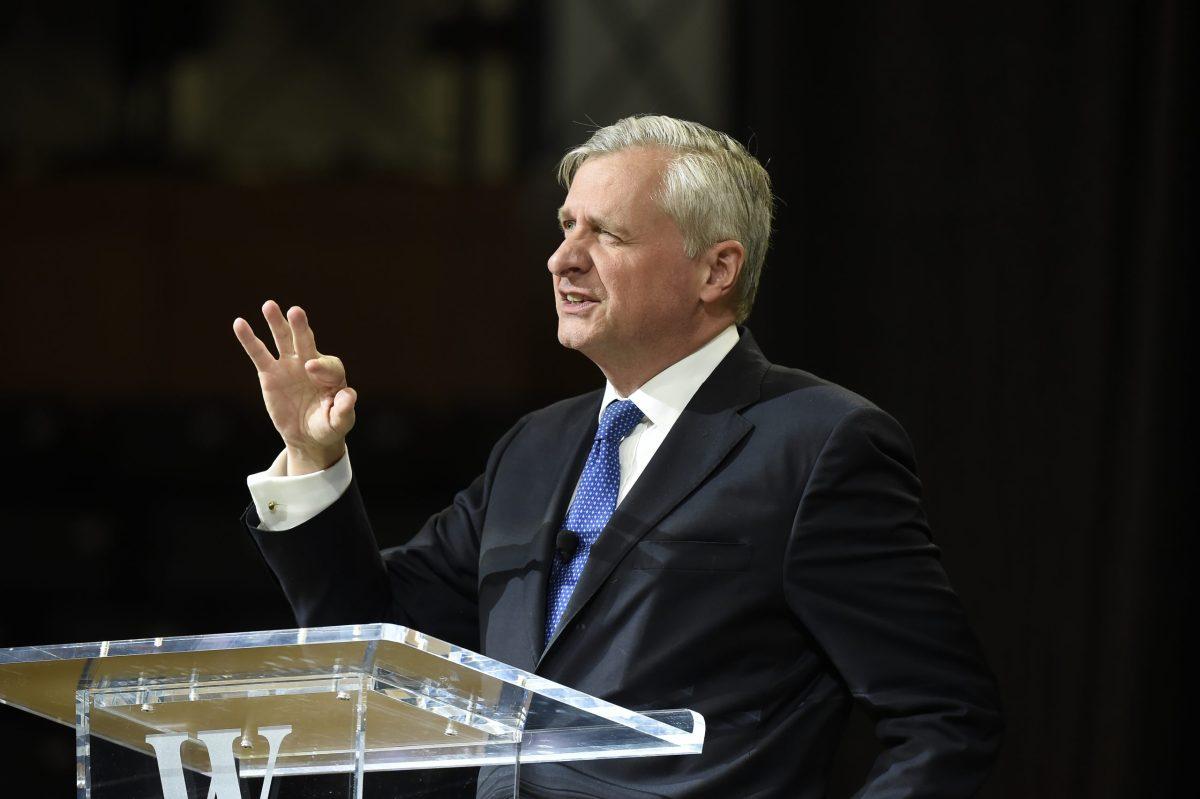Thoughts on Trump and what history has to say
President Samhat welcomed presidential historian Jon Meacham to Wofford on Tues. April 23 in the Jerry Richardson Indoor Stadium, introducing him as “one of America’s most prominent public intellectuals.” After Samhat’s introduction, Meacham took to the podium to address the audience that had gathered to hear his lecture, “Understanding Trump: The Meaning of an American Milestone.” In addition to Wofford students and faculty members, the audience consisted of alumni and others from the surrounding area.
Meacham’s anecdotes were well-received by the audience, as was evident by their responsive laughter. A well-studied historian, he described history as “a diagnostic guide,” adding that though it is “not fool proof…it is in fact the only thing we have in our public life by which to judge how far we’ve come or how far we’ve fallen.”
In regard to the current presidency, Meacham began, “I’m not here to make a partisan case, because people don’t tend to change their minds.” Instead, he offered a simple evaluation of today’s situation: “I think we’ve been here before.” Meacham’s conjecture was that, although President Trump is “the most unconventional person to become president in American history,” the leaders and citizens of the United States have encountered and endured much worse than incessant Twitter fingers. He recalled the condition of the nation during the eras in which Rosa Parks seated herself in the “whites only” section of a public bus to make a statement against segregationist policies, or when George Corley Wallace, Jr., ran for president on a Jim Crow, segregationist platform, won 13% of the vote and carried five states in the electoral college.
In comparison, Meacham predicted that, in 40 years, Trump’s presidency will be understood to have been “not as radical…as its worst critics feared.” The legacy of Trump’s presidency, he added, will also be affected by how his successors “ameliorate or exacerbate” the actions he has taken during his term.
Meacham emphasized the importance of empathy in regard to the organization and leadership of the country by taking into consideration the cultural implications of empathy. He used the example of taxes – “I pay taxes to benefit you, you pay taxes to benefit me” – to outline how he believes empathy can be mutually beneficial. The empathetic qualities of presidents like George H.W. Bush, he explained, added to their leadership abilities, while the lack of empathy exhibited by the current president hurts his leadership ability, according to Meacham.
Meacham also noted a number of past presidents who were lifelong learners, in his opinion, whereas, as he sees it, the current president “seems to have no interest [or] capacity for learning on the job” and “lacks, largely, self-awareness.”
As for how Donald Trump: businessman, television personality and WWE patron, become the United States’ 45 president, Meacham said this: “When the country’s recent history is considered, Trump’s 2016 election isn’t as shocking as it is often made out to be. In 2016, 17% of people trusted that the federal government would do the right thing—a 60-point drop since Lyndon Johnson’s presidency, which ended in 1969. This, among other factors, speaks to the relationship between the government and the citizens it governs.”
“If you voted for the president, you were sending the message that the country was in an irrevocable decline…you wanted to roll the dice,” he explained. On the contrary, he added, “If you voted against him, you’ve lit your hair on fire three times today.” In short, he summarized he nature of the people of the United States by saying, “It’s easier to define us by our divisions rather than what holds us together.”
He added, “If we think our problems are so special, we’re not doing justice to the people who fought,” whether that be fighting for civil rights or fighting to defend the nation and the values it upholds.
After his lecture, Meacham responded to questions from the audience, mediated by NBC’s Craig Melvin, ’01. In conclusion, he made one final remark about the many leaders America has experienced: “In a world of imperfect, fallen, sinful people…it seems to me we have to commemorate when [they] leave the world a little better than when they found it.”
Caption: Meacham delivered his lecture “Understanding Trump: The Meaning of an American Milestone” to a packed arena.




























